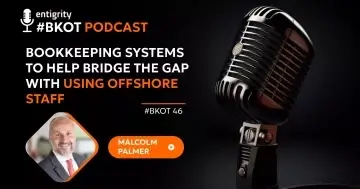Our experts Chris Rivera and David Cristello had discussed Regain Sanity in this podcast through simple workflow tweaks and more
#BKOT 32: BUILD A KICKASS OFFSHORE TEAM
REGAIN SANITY THROUGH SIMPLE WORKFLOW TWEAKS
Hosted by: Chris Rivera, Director Client relations, Entigrity Offshore Staffing
Guest: David Cristello, CEO & Founder, Jetpack Workflow
Transcript:
Chris: Hello Everybody! Happy Wednesday, thank you for joining us today on episode number 32 of #BKOT and today we have an awesome guest with us. We have Mr. David Cristello who is the CEO and founder of Jetpack Workflow and what we want to discuss is regaining sanity through simple workflow tweaks but also change management remote working tips and we'll go from there. So thanks for taking time out I know we have the extension going on with the season but let's go ahead and get started. So David, thank you for joining us today. Who is David? Tell us about yourself.
David: Yeah, well Chris thanks for having me. So as you mentioned my name is David Cristello I’m the founder and CEO of a software company called Jetpack Workflow and our reason for being is to help accounting, bookkeeping and payroll firms make sure they get all their client work done on time. So we have a software platform that helps you manage all your recurring deadlines and due dates, so things don't fall through the cracks and so if you have something you need to be done and you do it more than once our preference is to standardize it, automate the recurrence of it because there's so much recurring work and then give you a simple way to track it in our platform. In addition to that we also host the growing reform podcast so we're just big fans of the community and big fans of getting great knowledge out into the ecosystem and overall just excited to be here.
Chris: Yeah, you are a CPA yourself, how did you get jetpack off the ground, and can you tell us a little bit about that backstory?
David: Yes, absolutely so I am not trained as a CPA or an accountant and this really I think gets into the heart of the kind of a lot of what we do at jetpack workflow is we go out and we search for painful tedious time-consuming problems out in the lives of accounting owners, from owners of the business and so we ended up probably similar to maybe some of the accounting firms listening, interviewing a lot of potential customers or clients and found that one of the things that were blocking them from really obtaining their goals as a firm owner whether it's buying a firm, selling their firm, taking a real vacation was something that everybody kept saying was checklist management and I'm sitting here and I kept hearing checklist management, checklist management this was in 2014-2015. And I was like goodness there is so many checklist tools right there's probably ten thousand more checklists instead but there were so many in 2015-2014 and they were wonderful, there's all these great generic task management tools like a sauna, like a base camp and I said to the community I was talking with all these wonderful accounting promoters look here's a sauna, here's base camp these are wonderful great sophisticated complex tools you can use. They say oh this looks great I just have one question where's the client profile well they're not really built to have a client profile right they're kind of task management and they said are you kidding me we're an accounting firm everything's about our clients. I said okay well what about all these industry tools like they're great they've been around forever and they said well we tried them we didn't adopt it, we tried one not cloud-based, we tried it it's not collaborative enough, we tried it it's not simple enough and so kind of from there we built the first version of jetpack workflow, just really trying to be focused on the accounting firm needs and so out of that journey of interviewing started the software and we kind of just extended that journey of interviewing and that's what led to the podcast is that we're not the experts, we're here to understand what's going really well in the community and put that into simple software or surface best practices on our podcast.
Chris: That's awesome and the fact that you're absolutely right when I'm working with clients and this the first thing they ask is can my associate the kind of help me with my workflow, my processes, and checklist and it's like they're trying to put piece this all together and so what would you recommend a firm that's transitioning into maybe a fully virtual environment a partially virtual environment. What are some things that they need to do with their workflow right off the bat.
David: Yeah, so I'm going to practice all these recommendations with the fact that if you're like so many firms at least hybrid, so many are now saying we are virtual but let's say you're adopting a hybrid model, you are going to open your office again and some people are going to work from home so people are going to come in to me what that means is your remote first. You are now default to online, you're not default to remote and so as a preface for all these recommendations and if you find yourself in a hybrid model that means wherever you store information has to be accessible anywhere right. So that is the new if your previous default was putting something on a whiteboard having a live meeting and not taking notes not sending those recaps not recording things that has now shifted to me that's the only way to make the hybrid model successful is to say we're remote first we're going to take advantage of maybe the relationship factor of having brick and mortar but everything gets stored virtually everything is documented virtually so that's my preface to workflow and moving into the new environment. One of my favorite things to recommend as you're moving to this environment.
- if it's in your head it's nowhere! if it's on a whiteboard it's nowhere! if it's in the spreadsheet nobody looks at it's nowhere! and so you need to get all the steps out of your head into a public forum that everybody can view so that's really step one everything else.
I can recommend outside of that is not going to take hold unless you feel like you and the team you have whether it's your full-time team, your offshore team are not all running from the same playbook and this is pretty hard early on because we see with a lot of firm owners it is so documented in their DNA, how to perform these activities and maybe they even went down the path of writing down a checklist in the past but they know what to do so they never looked at it and then they hired a team member and they kind of know what to do and so they never looked at it and you kind of are already building the wrong nervous system in the firm you're going to have to go back and clear out some of that debt and re-document your steps and re-educate your team on these steps so kind of step number one on workflow tweaks and we have a couple that we're going to go through is brush off the dust if you have a checklist you haven't looked at a while and if you haven't even created one we have 32 free ones on our on our website or you can just open up a whiteboard and jot it down open up a notepad on your computer, just jot down the basic four to six steps because that's the average amount of steps we see in our tool four to six steps to complete the most valuable frequent services you deliver in your firm and share it with your team and say hey this is what I thought as a draft what am I missing, what is confusing get them involved in the process but get everything out of your head if you have a team fortunate enough to have a team get them into the process ask them for feedback, ask them what's missing that's really just kind of foundational step number one.
Chris: Yeah, that makes sense because especially when firms are making some type of transition, they don't know are we still a brick and mortar are we virtual and so you got to think of it in that virtual remote mindset first, and then kind of build from there and but a lot of times I see that they're just kind of piecemealing this together and going along the way and when you have change coming in, there needs to be whether you're five-person firm, one-person firm or 300 people firm. There has to be buy-in at the top and everything needs to have the leaders, the owners all need to be on the same page because if you're starting to bring in new staff and the onshore offshore or wherever it may be this is not in place this is going to be a real mess and so when you're implementing this whole change management process here. Talk to me about some of your thoughts on how to officially get this in place?
David: Yeah, absolutely! So a great question because what happens is the trap is if you don't think about this the firm owner, firm partner, the firm leader gets really excited they do all the work and then nobody follows right they really excited hey I got a new process I got a new checklist it's in this new tool and everyone's like oh frank's new tool week right and they might have experienced this before so I think it's important to explain if for the next evolution of our firm of where we're going to be for the impact to our clients, the impacts to our community, the impact to each other and what how we perform we are going to start building out our playbook, our DNA as a firm and I want you all to be a part of this journey so you need to explain to them why you're doing this and involve them into the process and say look we're going to start step one we're going to brush off the dust of maybe checklist we haven't looked at in a while, I'll do the first draft review and then I want feedback from everybody and what's missing maybe we'll do a virtual zoom maybe we'll do an in-office lunch.
Whatever it is get your team involved in co-creating this process of cleaning it up giving you feedback and then I would say when you're ready to take that process and put it into a software like Jetpack Workflow or whatever software find your champion and this the good news for firm owners is you don't have to be the champion and in most cases you shouldn't be the champion right, if you have that admin person, that operations person, that tech savvy accountant, that you've hired and they're really jazzed up about this new tool platform. Let them run with it let them become the in-house expert on the platform on the tool and let them be the go-to person we've seen this time and time again we've gone through thousands of firms and we look at our successful adoptions and successful setup. It's about that person who has that drive who has that fire to really lead the change and again I highly recommend it not be the firm owner because what happens; client calls up big deal comes in partnership comes in a team member gives you two weeks notice, then all of a sudden the project's put on hold so you going to think about this as what happens once a fire comes up because before you set up systems and processes nine times out of ten as a firm owner you're in firefighter mode.
And that's what makes adoption and setting a new tool so hard so hard it's because you're putting out fires left and right it feels like that's in addition to being in a pandemic, that's in addition to taxis and changing a million times it doesn't mind changing a million times so if you're fortunate enough to have somebody in place that you can kind of ignite them as a champion I would say do so if you're back against the wall and it's really only you then I would say start simple, start small, look for the quick wins right, you don't need to build the whole platform the whole system today just get things out of your head and a transparent system everybody could look at.
Chris: Yeah, now you're spot on and I feel that in working with clients myself they have problems delegating right, they just need to do that and work together as a team collaborating on this. If it's the way to go and then when somebody kind of takes that lead they're appointed and then you meet again right virtual or in-house and you discuss how you're going to implement this and then continually communicate and everything that everyone's on the same page and things start going smoothly. So when the delegation doesn't happen it's all in one person everyone's waiting and that can create a lot of tension especially if you're trying to staff up for it for the season and bring in new folks.
David: Yeah just on delegation Chris because I think it's such a good one for regaining sanity. And for firms that maybe have tried to delegate maybe they feel like they're still too much on their plate there's two concepts I really want to get across the first one is what will really help is the first one I like to call you'll start when ready so make it an institutional rule that you're not going to start an engagement or a project or job or whatever you call it so we have all the required materials to complete that job, because I think one of the most frustrating things that happens sometimes when you delegate is somebody will start something they're halfway through they're missing something from a client they go on the client chase they can't get ahold of client they loop you in then you're doing firefighting with the client and so the question is why did you start in the first place if you'd have everything from a client.
And so you could set up this kind of pre-start checklist unless we have these six materials and we know we have these six materials from the client we're not going to begin this engagement we'll communicate this to the client, we'll communicate it to the team member and I'll know this and it's just that kind of quality check that you put into a workflow process that gives you that trust factor that this team member is going to have all the resources they need to complete that job.
So start when ready helps with kind of the handoff between team members the other thing I'll say is whatever tool you're using use it right and so what I mean by that is if it has and almost every tool does kind of collaboration built into your project management or workflow system, they have these at mentions where you can talk back and forth you see it in almost every tool I'm a huge fan of if it's not if the conversation's not in the tool it didn't happen because what happens is if you delegate and you don't institute a role like look if it's not in the jetpack it didn't happen right. If it's not in salesforce it didn't happen then you're scrambling to get these messages and as a firm owner the reason you're probably not delegating because you have a certain kind of trust or anxiety about letting that go but if all the communications in that tool if anything ever goes wrong you can open up the tool maybe you miss a deadline well the question should be in the tool right you should have asked me the question in the tool; I'm stuck I need help, if you contacted the client that should be in the tool, if you're looking for more information and you ask the peers that should be a tool so as a firm owner, if things are going well you should be able to retrace the steps because everything's in the tool all the notes are there and if it's not going well which is kind of everybody's fear it's in the tool and good news is for most tools if it's in the tool you could probably catch it before you missed the deadline you could catch it before it becomes a fire right so that's a really important component of delegation.
Chris: Yeah, no and when it's the owners’ partners are working too much in the business and they need to be working on the business I have read anywhere 65 -75% is client interaction and correspondence and if there's a point of lead or another contact there and everything is recorded like you were saying anyone could take on that task and be able to manage for the client who is what we're all working for. So it's a necessity and then even when you're working with a new staff member they could easily start seeing this and they could even pick up things whether they're in the office, whether they're onshore whether they're offshore too and so it just makes everything simple sometimes just the simplest things just less is more per se and as you as a global company as well how when did you start did you started in the states and you started expanding from there.
So what are your thoughts about offshore staffing and working with offshore staff as you've grown globally?
David: Yeah, I mean it's a trend that's obviously only going to continue and I think Covid and the pandemic is just going to accelerate that I mean it's already moving in that direction I mean clearly the move to virtual only expedites that move I think as the network and Wi-fi of various economies improve as the education of various economies improve, we're going to continue to see more and more of this and so it's certainly our core team is here in Pittsburgh-Pennsylvania not every person who works at jetpack workflow is based in Pittsburgh-Pennsylvania right we have great people in the UK, we have great people in brazil and you can really find amazing talent in many places right and so I think if you have the right mindset, you have quality controls, you have checks things are standardized, you have great communication, you could really kind of build out your capacity in many different ways and we've seen this on the accounting firm front I mean we've done a number of interviews for firms that really hit the limits of their capacity and decide that they want to try offshoring and in the majority of cases they've had a really great experience.
I think it's just 10-15 years ago kind of got a bad rap for kind of quality and communication and some of those probably deserve and I think now the industry's matured and I think there's great protocol and processes both for security around what they can access and not access and then just overall quality of work as well so I think there's a lot of opportunity there and it's only going to grow.
Chris: Yeah, and as we continue in this type of environment there's going to be persons and leaders that need to be in place to continue this change management that's going on and so when you're working with a firm, can you tell me a little bit about kind of some pointers of to have a firm owner kind of implement this into their day-to-day operations?
David: You mean workflow specifically or delegation and collaboration?
Chris: The whole collaboration part because as we said as you've gone globally as you've grown and you have different offices right, what can you recommend to firm owners about how they could expand not just in their city how they could expand nationally for clients as well as their staff?
David: Oh yeah, so this is one of the biggest opportunities I think of being whether you're hybrid or virtual 100% right. If it opens up it opens up your client acquisition tremendously you can now and you could really focus on niching down right we've seen this a million times that niche is our riches are niches and whether it's dental practices or design firms or creatives or SAS businesses or shopify, e-commerce stores.
There's so much power to niching down and you can only really niche down successfully at least from an industry perspective if you move virtual and if you have a handle on what to do daily to manage all these moving pieces and so we're fans of whether it's live on a zoom caller in person or asynchronously through a written update it's just day-to-day what did you do yesterday what's on your plate for today and where are you stuck right, it's just a really quick everybody knows, it as the huddle and yeah the classic huddle we see a lot of firms do this daily I would say if you're not doing this daily don't worry the firm's not going to go under we've also seen it happen weekly right it's either weekly or daily.
I've never met a successful firm that just says hey we're just we just don't do this we don't do check-ins the weekly one is typically Monday you're typically all coming together for 15-20 minutes, seeing the workload for the week seeing what was stuck from last week. If somebody has learned something interesting about a client or about an industry that might share it, there if somebody's stuck on a client issue they might talk about it in that meeting and it's a great knowledge share and perhaps selfishly one of my favorite tactics, somebody mentioned to me recently is they open up jetpack workflow they look at the list and if there's some things that haven't been cleaned up or updated they put on the jeopardy clock they run it for five minutes and say now it's time to see how much jetpack we can clean up right, because we know humans are human not every due date is going to be updated the way it need be or the thought it's updated.
And so I think early on with the change management process whether it's a jetpack or it's a different tool or different platform you can actually infuse that into your weekly meeting I just put in a little five minute. Let's open up the tool let's clean it up five minutes let me debrief about a new feature in here or something like that but I think those touch points again I mentioned them as a lot as live you could do it written as well in Microsoft teams or slack, google docs or whatever it's really important to just certainly with a virtual team keep everybody on the same page.
Chris: Yeah, and I think in the aspect of meetings I mean you have to prepare for one but they're very important to keep everyone on the same page and I know it's hard especially right now to do one-on-ones but you have to at least do a group meeting to keep everyone on the same page and if you can't do daily at least weekly and so I totally agree with that because things are going to get lost in translation, people are going to get frustrated and they feel comfortable seeing their colleagues on zoom, slack, team, skype and being able to have that floor and create the open environment to express whatever's on their mind or some ideas or something they came across and so I'm a big proponent of having these types of meetings especially if you're going to scale and grow onshore and offshore to be able to do this because otherwise no one's going to know what's going on and it's just very important and just for you lose that whole in the office you can't just pull everybody together it's hard so you need to be consistent in doing these meetings. So I completely agree.
David: You made such a good point you have to prepare for them if you're leading them you got to put the deck together and it doesn't have to be overly complicated could be three or four slides of the same questions every week or the same five bullet points every week and then I you whether it's coaching your team members just kind of know this in advance they should come ready to talk about whatever they need to talk about what they completed last week, where they're stuck, the client issue and that's part of you reinforcing that aspect for your team so maybe the end of the week on a Friday they should jot up their notes of what they're going to say Monday something like that you could put into place too.
Chris: Yeah, so we're winding down now and really appreciate you taking time to do this with me today. So as we wind down any final thoughts or any other items you want to speak about before we sign off here?
David: So the final thing I'll say the final tip or tactic that I'll mention in this journey of regaining sanity through workflow is one of the biggest foot faults we'll call them or backwards steps you can make as you're in this journey and it's so innocent and you feel so great when you do it is let's say you're the firm owner the firm partner you have a team member and they're stuck and they're they come to you and they ask you a question or they slack you a question the Microsoft teams you a question and you answer it.
I got to help them and it's great you feel really good about it right and it seems so innocent takeaway here is stop answering those questions and put them into a system right because every time you answer that question from your team you're reinforcing the groove that you're the person to come to get the answer and that's not going to scale and it's going to severely restrict your ability to take time off to you exit the firm sell the firm by even buy new from whatever you want to do and so somebody comes to you with a client question right open up wherever that information should live if it's in a spreadsheet, if it's in a workflow tool, if it's in a practice management tool, they're great let's double check that first like we can double check it together make sure it's there and you need to build a culture and a nervous system where people are looking at the source of record first before they come to you.
Now look again people are people you're going to have team members that come to you maybe it's a new staff member and they have a question point them to it go to the password vault did you look at the google doc right and let's update the google doc if I miss something like that's okay it's not it's not a way to penalize somebody for not looking at the source of record or the practice management tool the workflow tool but you need to remember always point back to the source of record and build that culture of people looking there first and documenting it there first and that is going to give you a huge amount of sanity at scale as you continue to kind of reinforce that behavior so that's what I'll leave everybody with.
Chris: Yeah that's awesome because if you're that go-to person and you don't ever deviate away from that it's just going to continue and you bring in new people they're going to keep going to you and you're going to be in your business.
David: It feels great.
Chris: It does yeah.
David: It feels great to answer the question though that's the hardest part of the business.
Chris: Yeah, that was awesome well said David thank you so much. So for now everybody thanks for joining in today we'll be back soon actually tomorrow at the same time. And David thank you again for your time today, and look forward to working with you in the future. Take care.
David: Thank you thanks so much.
Entigrity™ is a trusted offshore staffing partner to over 550+ accountants, CPAs, and tax firms across the US and Canada. Our flexible and transparent hiring model gives helps firms of all sizes to hire staff for accounting, bookkeeping, tax preparation, or any other task for 75% less cost. As a firm 'run by accountants, for the accountants', Entigrity captures the hiring needs of accounting firms most precisely, providing staff that works directly under your control and management, still, you are left with least to worry about compliance, payroll taxes, overheads or any other benefits.

_1642676318-1686039629.webp)



